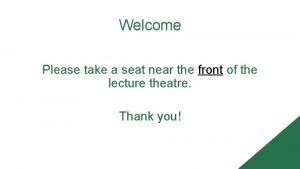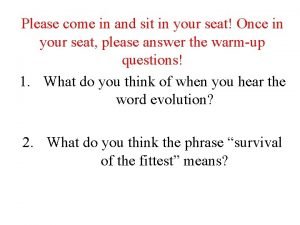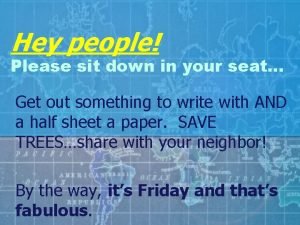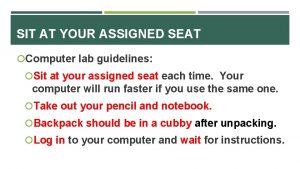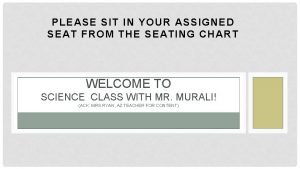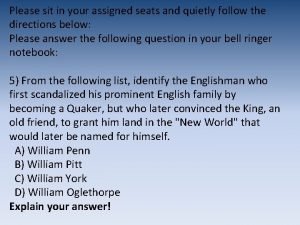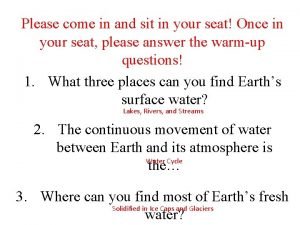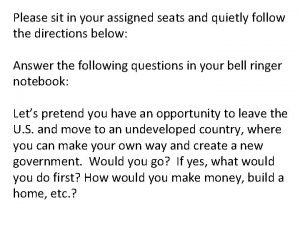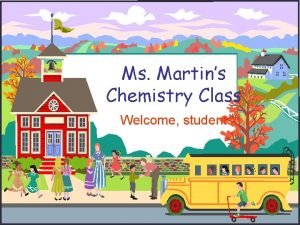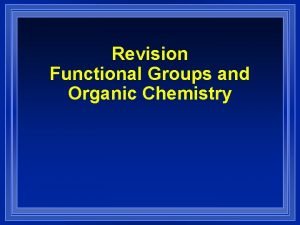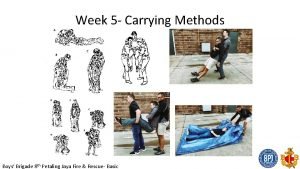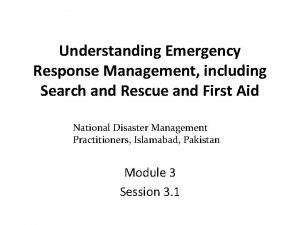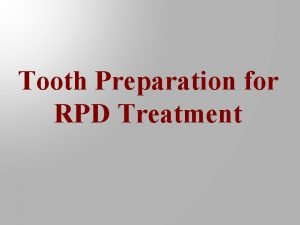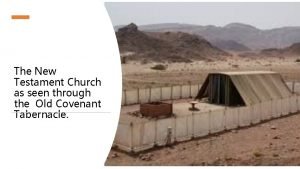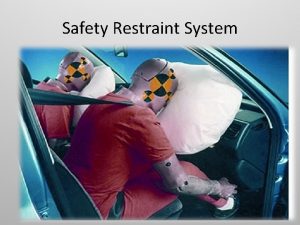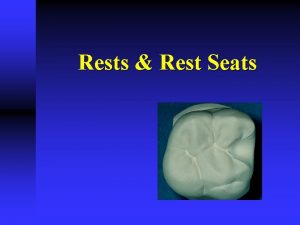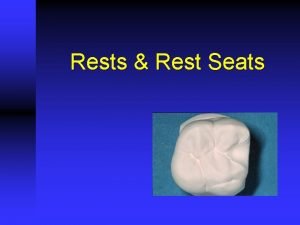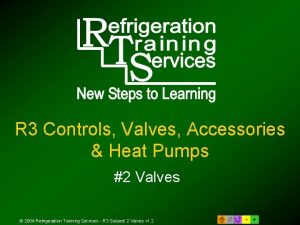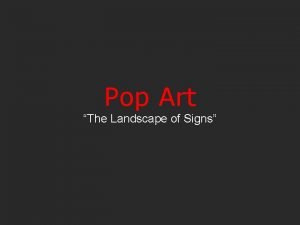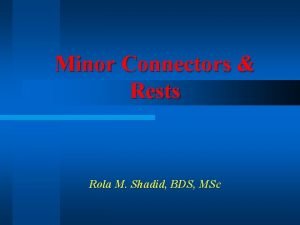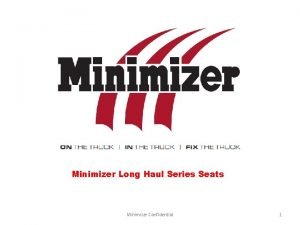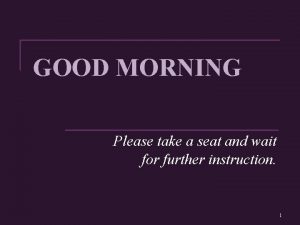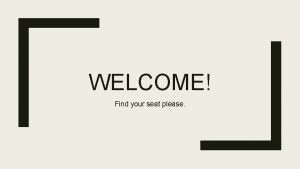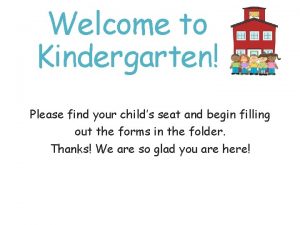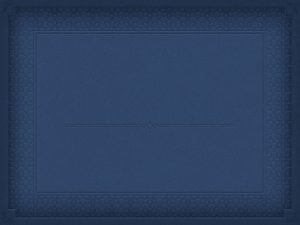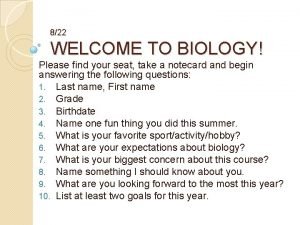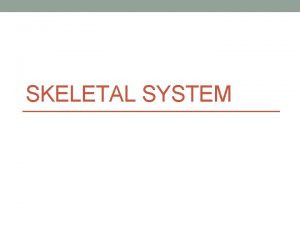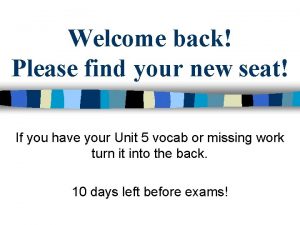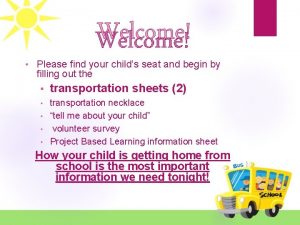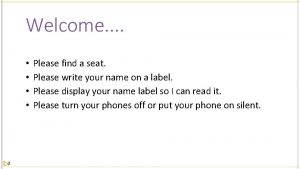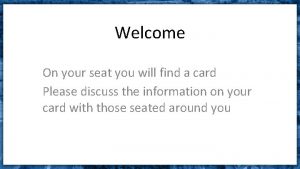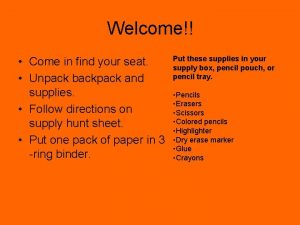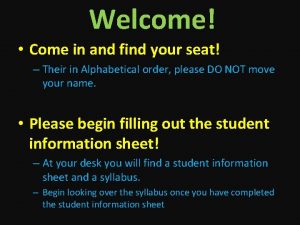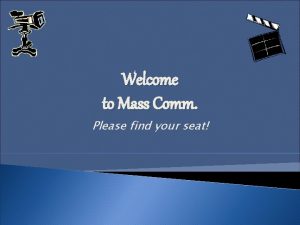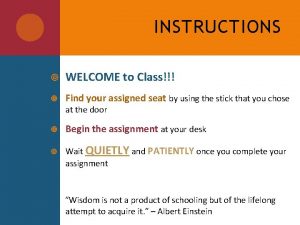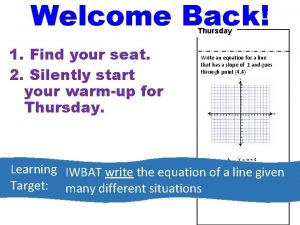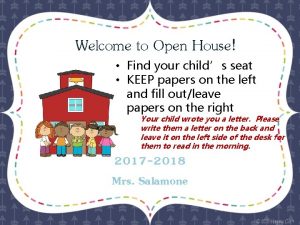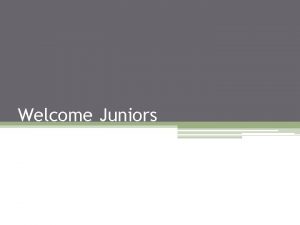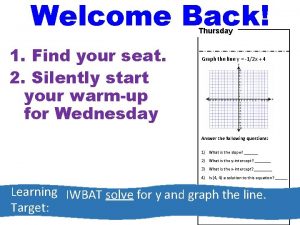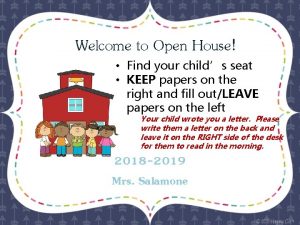Welcome to Chemistry Find your seat On your
























- Slides: 24

Welcome to Chemistry!!! Find your seat!!! On your notecard, please write 1) Name 2) Class Period 3) Something Interesting about yourself! 4) What do YOU think Chemistry is?

RAIN Lesson!!!

5 TH period Expectations / Student Responsibilities: Use primarily during passing periods Throw trash in designated areas Flush toilets after use Use facilities quickly to allow others access Socialize outside rather than inside to allow others to use facilities Report graffiti or lack of supplies immediately to teacher Use zoned bathrooms only Student may not use the bathroom the first 20 minutes or the last 20 minutes of class. Bathroom Expectations Activities: Discuss taking care of personal business during passing periods (why is this important, reinforce tardy policy, real world examples, discuss the water saving features of the toilets etc…)

6 TH period Library/Technology Lesson Plan Expectations / Student Responsibilities: Enter the facility in an orderly, respectful manner Communicate effectively, allowing students to work productively on academic assignments Keep areas free of food and drink at all times Use equipment and materials in a productive, respectful manner Report all broken or unusable equipment to the teacher prior to use Demonstrate mutual respect for others when using the facility Access only the district approved websites RAIN IN LIBRARY POWERPOINT

7 TH period Dress Code/PDA Expectations / Student Responsibilities: Dress modestly to represent our school in a positive manner Be aware of clothing that may offend other students, teachers, staff, and visitors Show respect for others by not engaging in extensive public displays of affection. (Catch and Release) Activities: Discuss catch and release and what that means in terms of PDA, discuss what would be considered appropriate contact vs. inappropriate contact. Discuss dress code hot topics: tank-top straps must be at least three fingers in width, no sagging, Shorts/Skirts must be finger tip length, etc…

8 th Period Assemblies & Sporting Events Expectations / Student Responsibilities: For Assemblies: Move with teachers directly to designated area. Sit in designated area Listen attentively to all speakers/presenters Participate in a manner appropriate to the activity Exit in a safe and orderly manner Return to class promptly Remain for the entirety of the activity Speak and act respectfully toward participants Keep assembly area free of drink and food For Sporting Events: Remind students to be respectful during the National Anthem, to clean up after themselves, cheer appropriately, etc. Activities: Discuss the purpose of having an assembly (Team building, pep rallies, presentations, end of year ceremonies, etc…. ). Is it a right or a privilege? Brainstorm possible behavior expectations

So what IS Chemistry? What questions do we ask in Chemistry?

Formal definition �The study of the composition, structure, properties and reactions of matter.

What supplies do I need for this class? 1) 2) 3) 4) LARGE (11” x 8. 5”, 5 -subject) spiral notebook Plenty of pens and pencils GLUE for notebooking Scientific Calculator ($8 at Walmart!)

What is my Homework for tonight? 1) Get supplies! 2) Read and sign Flinn Safety Contract 3) Fill out Parent Info Sheet & Return by next class.

Lab Time!!! 1) 2) 3) 4) Read ALL directions before beginning the lab. ALWAYS wear your GOGGLES Raise your hand if you have ANY questions! Clean up your lab station when you are done (it needs to look EXACTLY the way you found it when you began. )

Investigating Changes Lab �READ the procedure first �Write down your hypothesis �DO lab experiment EXACTLY as directed in the procedure. �Write down all Observations, Controls, and Variables. �WHEN YOU ARE DONE: �Clean up (rinse all glassware with water) & RAISE YOUR HAND when you are done. I will come check to see if you have cleaned up properly. Then I will dismiss you from the lab to put up your goggles and go back to your tables.

Parts of a Scientific Investigation

What makes a good hypothesis? Prediction �An attempt to guess what will happen �Not testable �Does not explain Hypothesis �Uses observations and research in order to make a testable statement �Can predict the results �Hypothesis is either supported or not supported by data/evidence

What is a control? �A comparison needs to be made in order to see if there is a change �A control will have the exact same setup as the others except for one variable you are testing � A control gives you something to compare your experiment to.

What is a Variable? �Variables are the parts in the experiment that CHANGE.

Example #1 �In order to see if a certain medicine as the desired affect, one group is given the medicine and the other is given a placebo, sugar pill. What is the control & What is the variable? �Control: Group with the placebo (Sugar pill) �Variable: Medicine

Example #2 �You are trying to determine if crushing an Alka. Seltzer tablet will dissolve faster if it is crushed. What is the control & What is the variable? �Control: Setup with tablet NOT crushed �Variable: Crushing up tablet

Example #3 �If you wanted to see if different colors of light affects plant growth, how would you set this up, and what would be your control? �Many different plants grown under many different colors of light. �Control: a plant grown in the dark.

Testing the hypothesis will produce two types of data… Observations! Qualitative Quantitative �Deals with DESCRIPTIONS �Data is observed but not measured �Uses 5 senses �Deals with NUMBERS �Data is measured �Example: An odorless gas was produced. �Example: The gas produced a volume of 22. 4 Liters Think Quality! Think Quantity!

Changes are about how matter transforms into something else. Physical �An action that changes appearances, without changing the composition. �You still have the SAME thing �You CAN reverse the change easily. Examples: Boiling/Freezing water breaking a piece of wood dissolving kool-aid Chemical An action where a new form of matter is created by rearranging atoms from the original matter. you get something NEW you CAN’T reverse the change easily Examples: -Splitting water into hydrogen and oxygen -burning a piece of wood -combining an acid and a base to produce salt and water.

Signs of a Chemical Reaction � There are five indicators that a chemical reaction has taken place. � They are… 1. 2. 3. 4. 5. Change of color. Change in temperature (hot or cold). Evolution of a gas. Appearance of a precipitate (solid) Light.

Three types of investigations: �Descriptive Investigation- describing and/or quantifying parts of a natural or man-made system �Comparative Investigation- collecting data on different organisms/object/features, or collecting data under different conditions to make a comparison between two or more things � Experimental investigations- designing a fair test in which variables are actively manipulated, controlled, and measured in an effort to gather evidence to support or not support a causal relationship Note: Not all experiments will follow the scientific method

Exit Ticket �Write your NAME, DATE, and CLASS PERIOD at the top 1) Write down one example of a chemical change. 2) Write down one example of a physical change.
 Welcome please take a seat
Welcome please take a seat Welcome welcome this is our christmas story
Welcome welcome this is our christmas story Sit on your seat
Sit on your seat Please sit down and your seat belts
Please sit down and your seat belts Sit in your assigned seat
Sit in your assigned seat Sit in your assigned seat
Sit in your assigned seat Sit in your assigned seat
Sit in your assigned seat Please come in and sit
Please come in and sit Sit in your assigned seat
Sit in your assigned seat Welcome to chemistry class
Welcome to chemistry class Ib organic chemistry functional groups
Ib organic chemistry functional groups Inorganic vs organic chemistry
Inorganic vs organic chemistry One plus one equals zero
One plus one equals zero Blanket drag technique
Blanket drag technique Human crutch two person drag
Human crutch two person drag Incisal rest seat
Incisal rest seat Picture of the lampstand in exodus 25
Picture of the lampstand in exodus 25 Rear right safety restraint system fault
Rear right safety restraint system fault Embrasure rest seat
Embrasure rest seat Double embrasure rest seat
Double embrasure rest seat Front seat valve
Front seat valve Robert arneson typewriter
Robert arneson typewriter Cingulum rest seat
Cingulum rest seat Minimizer long haul seat
Minimizer long haul seat Good morning please have a seat
Good morning please have a seat
